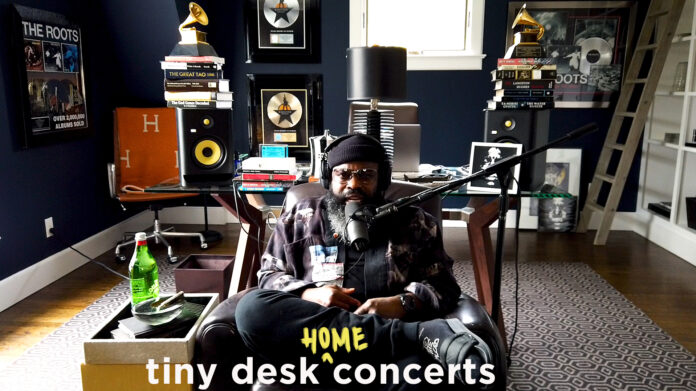Bob Boilen shares how NPR Music is managing, what it was like to work with John Prine, and his concert recommendations for a pandemic.
NPR’s Tiny Desk concert series has gained fame for hosting a well-curated selection of artists who deliver intimate performances in an odd setting: a literal tiny desk at NPR’s office building in Washington, D.C. When NPR shut down its office to protect its staff in March, the physical Tiny Desk went dark, too.
The NPR Music team and Bob Boilen, the creator and host of NPR’s “All Songs Considered” and the Tiny Desk concert series, found a new intimate space from which to broadcast performances: artist’s homes.
LaForme: They’re not entirely on pause, right? You’re doing a Tiny Desk at Home series.
Boilen: It was obvious around that middle March period that we were going to close things down, for at that point at least a month, there are many artists who are new or at home alone, and I thought would make a great little concert.
The beauty of the Tiny Desk concert series is the intimacy. And there is nothing more intimate than someone sitting in their bedroom on their on their bed with their posters on the wall, giving a concert. The spirit feels the same, which is why I wanted to do it.
LaForme: And what have you heard from the artists so far? How have they been responding to this brave new world?
Boilen: Because we’re still on the relatively early cusp of it, everyone seems to be pretty excited about it.
Tiny Desk has become an important thing for new and emerging artists to get the word out, which then they follow up going on tour, playing small clubs, and the Tiny Desk comes out and then they play larger clubs and it’s a working class living style. You work hundreds of days a week. Tiny Desk helps levitate and accelerate careers.
Now, yes, they can do a home concert, but how do they make their money? And I think that’s the big issue for musicians. It’s one thing to put your music out there. It’s another thing to be able to make a living. They get some money from streaming but the bulk of money that artists make is playing shows and selling merchandise. When that goes away, that’s big.
So we try and approach people — and maybe we’ll try to figure out another way to do this online — but we try to encourage people to support the people they love.
LaForme: I understand you extended the Tiny Desk Contest, which allows artists to enter to perform in a Tiny Desk concert, for a while, and I know it’s due in a couple days now. Is that to help more artists?
Boilen: It was obvious that a lot of musicians were going to be home doing … what? Not much. And it felt like an opportunity for people who wouldn’t have had the time to submit to do it. And so we’ve gotten a great deal of submissions from solo artists, artists who are doing the equivalent of Zoom. Because we’re trying to not encourage people to get together to do this contest. So, technologically getting together to do each song.
Their art is all about creating given the circumstances. That’s what the Tiny Desk is about — it’s about, hey, we’re not going to amplify your singer’s voice, so what are you going to do about it? You’re going to create and make your arrangements that are going to be different.
Well, here we are in another situation where artists can’t be together. The best thing artists know how to do is make the best of the situation. Creative people, that’s what they’re all about. We’re seeing a lot of interesting submissions because of what’s happening. It is indeed very different in the Tiny Desk contest world.
ANALYSIS
NPR’s Tiny Desk concert has indeed been widely recognized and beloved for many years now. The self-stated intimacy it creates between viewers and artists through a screen is something truly unique; it has given rising artists a platform to introduce their music as well as their personality, inviting more users into devout fandom. Older artists have even found a renewed sense of success for the new context to present their work within.
The opportunity that Tiny Desk presents is for new musical experiences. With the sudden transition to modes of social distancing and the financial repercussions on music professionals, it is likely that typical mediums such as the concert space will be one of the last things, if not never, to return to some semblance of normalcy. This is not unhopeful as stated by Boilen, “The best thing artists know how to do is make the best of the situation.” It is likely that live music will need to assume new contexts, perhaps like the Tiny Desk model, in order to remain alive.




